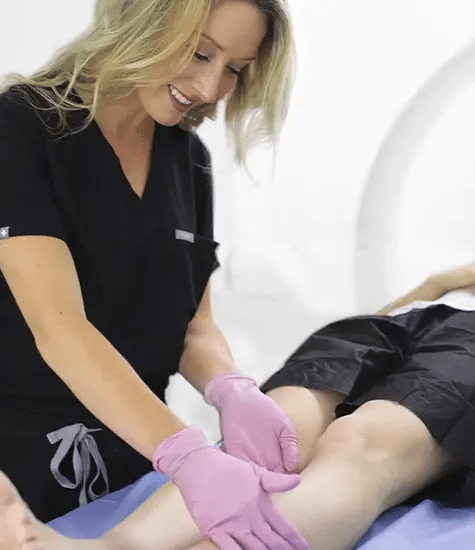RFA, or radiofrequency ablation, is a medical procedure used to treat spider and varicose veins. In this procedure, a numbing agent is first applied over the area where the diseased veins are. Then, heat is applied using radiofrequency through a catheter (a thin, flexible tube) into the vein. The heat stops blood flow into the diseased veins, and over time the veins are absorbed by the body and disappear.
How much does RFA cost?
The cost for RFA depends on the extent of spider and/or varicose veins as larger spider and varicose veins may require multiple sessions, and the state where you are getting treatment. On average, radiofrequency ablation is a more advanced option for treating spider and varicose veins as compared to other options, which is why this procedure tends to be more expensive than others. On average, RFA treatment can cost between $3000 to $5000. Factors such as the extent of spider and varicose veins and the state you are getting the treatment in can vary the costs.

Is RFA for vein treatment covered by insurance?
This depends on the purpose of the treatment procedure. Varicose vein treatments are covered by most insurance companies, as long as they are deemed ‘medically necessary’. For this, some insurance companies may require a referral to cover treatment so they can verify that it is medically necessary. Even then, it is possible for the front office staff at the vein center to obtain a referral on your behalf. Speak to the vein center about this when you book your appointment. They can then gain an understanding of your insurance coverage and maybe even obtain a referral for you without you having to go through the hassle of visiting your primary care physician.
However, spider vein treatment is generally considered a cosmetic treatment and not medically necessary, which would mean that most insurance will not cover spider vein treatment. It is best to discuss with the doctor’s office to determine whether your insurance does cover the treatment.
Is RFA for vein treatment painful?
RFA is a generally safe and simple procedure. Radiofrequency ablation is performed with a local anesthetic, which means that patients are unlikely to feel any pain during the procedure. You may feel slight cramping and discomfort immediately after the procedure. As you heal, you may experience swelling, cramping, discomfort, and some amount of pain.
What are the side effects of RFA?
Like with any medical procedure, RFA comes with certain risks and side effects. Side effects can include swelling and bruising on the area of treatment, change in skin sensation, hyperpigmentation, infection, persistent pain, scarring, and ulceration. The risks of developing these side effects depend on your surgeon’s abilities and your body’s temperament. This is why it is important to make sure you do enough research on finding the right vein specialists for your treatment. Your doctor will discuss the likelihood of the risks against the benefits of the procedure with you before the procedure.
How long does it take for RFA to heal?
The time taken for your legs to heal after RFA depends on multiple factors, such as your general health disposition, the extent of your treatment, and how well you look after yourself after the procedure. On average, it takes around ten to fourteen days for you to heal sufficiently to perform all your usual activities after a radiofrequency ablation procedure.
How do I prepare for vein ablation?
If you decide to get a radiofrequency ablation for spider or varicose veins, your doctor will advise you on how you can prepare for the process. Here are some things you may want to keep in mind before your radiofrequency ablation appointment:
- Arrange for transport to and from the treatment center. This is because you may be given anesthesia for the procedure, and it is a good idea to have someone drive you to and from the center in that case.
- Drink plenty of water so that you are well-hydrated.
- Wear comfortable, loose-fitting clothing.
- Make sure to pack your compression stockings.
- Carry a change of clothes, including underwear, in case the area of the affected veins is close to the groin area. This is because your underwear and clothes could potentially get stained, depending upon where your affected veins are located.
- Do not smoke or drink for at least two days before the procedure. This is because smoking and drinking can slow down healing after the procedure.
- Do not take aspirin, ibuprofen, or any non-steroidal anti-inflammatory drugs at least seven days prior to the procedure.
The Vein Clinic boasts a team of highly experienced vein doctors who are at the top of their fields and have all been trained at Ivy League universities. All our doctors are fellowship trained and double board certified. With cutting edge, state-of-the-art technology and world class medical infrastructure at their disposal, these vein specialists use the most advanced procedures to treat their patients. To top it all, our doctors know to keep patients’ comfort ahead and treat them with friendliness, patience, and kindness.
Our vein clinic at San Diego is currently located near the Torrey Pine beach state park, close to the Westfield UTC Shopping Center. In San Jose, our vein clinic is located in a beautiful neighborhood near Palo Alto, Sunnydale, and Santa Clara. It is down the block from the Santa Clara Medical Center, and the Santana Row Shopping Mall. Our experienced Harvard-trained vein doctors can offer the best care possible to help you.